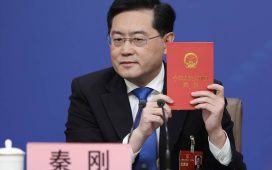
Birmingham voted for Brexit by a trifling margin in 2016, defying the narrative that ethnically mixed, economically buoyant cities don’t want to leave the EU. Ahead of the UK’s departure from the bloc on January 31, there is concern here about Brexit’s impact on business and jobs – but also a sense of relief that Brexit is finally happening.
The metropolis of the Midlands confounded expectations when it voted Leave by 50.4 percent in the 2016 Brexit referendum. Birmingham has one of the UK’s most ethnically mixed populations (just 53 percent of residents were classed as ‘White British’ in the most recent census, in 2011). Business is thriving: many big international companies are based in the Birmingham area, including hi-tech exporters like luxury carmaker Jaguar Land Rover and engineering firm IMI. The city centre gleams with new glass buildings, towered over by the cranes constructing even shinier edifices.
Now that Britain is leaving the European Union before embarking on the next set of talks, the locals seem to be more anxious about the economic risks Brexit entails. “There’s worry about the impact on jobs, particularly in the car sector,” said Tom Pratt, convener of local anti-Brexit campaign group EU in Brum (Brum being a nickname for Birmingham).
“Our business imports metal components from Europe and the volatility that Brexit has brought has not made it easy from a business point of view,” added a marketing executive for a small company owned by a German firm, who preferred to remain anonymous.
Automotive sector concerned
These concerns may well intensify as the UK goes through the final stage in the Brexit process.
When Britain leaves the EU on January 31, it enters the so-called transition period – a mechanism to prevent a cliff-edge exit by keeping the UK under European rules while it negotiates a new trading relationship with the bloc. Conservative Prime Minister Boris Johnson has repeatedly vowed that he will not extend this period beyond its current deadline – December 31, 2020 — which, analysts say, risks crashing the British economy out of the European bloc in a de facto no-deal Brexit.
Earlier in January, Chancellor of the Exchequer Sajid Javid told the Financial Times that “there will not be alignment” with EU rules after Brexit. In effect, this means that access to the single market in any new commercial deal will have to be limited, as Brussels has consistently warned, creating barriers to trade with the continent.
“Javid can say the UK is not going to follow EU rules as much as he likes, but the simple fact of the matter is that any company based in the UK that wishes to export to Europe will have to play by European rules,” said Alex de Ruyter, director of Birmingham City University’s Centre for Brexit Studies.
He added that if the government is true to its word in pursuing divergence from EU laws, this would threaten to wreak serious damage on companies like Jaguar Land Rover in particular.
“It could cost the automotive sector billions,” de Ruyter warned.
For some in the Birmingham area, the social impact they expect from Brexit is even more worrying than economic concerns. “The further divisions in society that Brexit can cause will be at the forefront of my mind when Britain withdraws from the EU,” said a resident of leafy Birmingham suburb Sutton Coldfield, who asked to be kept anonymous.
“I feel that many politicians’ populist arguments for Brexit were based around emotive topics that were morally questionable and bordering on scaremongering; the seemingly key issue of immigration being one,” he continued.
“Living in a multicultural city which has benefitted from immigration both culturally and economically, I find what I see to be the clinching immigration argument hard to swallow.”
‘Groundhog Day’
However, others in the Birmingham area see January 31 through a very different perspective.
“Brexit could provide additional capital to be spent domestically once we are no longer in contributing to the EU budget; hopefully this money could be put to better use,” said a Brexiteer from Solihull, a commuter town just outside Birmingham that voted Leave by 56 percent in the 2016 referendum.
Of course, the Brexit debate’s most well-known reference to the EU budget was a slogan on a Vote Leave bus that claimed the UK sent £350 million per week to the EU which could be better used to boost spending on the NHS, Britain’s cherished public healthcare system. This claim was soon revealed to be a lie. “In any case, the impact on the economy from changes to trade after leaving the EU is likely to be far bigger than savings from the UK’s membership fee,” states the non-partisan fact-checking website FullFact.
But by this point, it seems that issues like the precise nature of the Britain’s contribution to the EU budget are of diminishing interest, because for many Brexit has simply dragged on for too long.
It is significant that the Eurosceptic from Solihull described January 31 as a matter of the UK “finally” leaving the EU at the end of a “long, drawn-out, laborious process”.
After then-prime minister Theresa May spent two agonising years negotiating a withdrawal agreement with the EU, the House of Commons rejected it three times as her lack of a parliamentary majority tied her hands. When Johnson forged a slightly modified deal with Brussels in October, the Commons rejected its timetabling, leading the prime minister to try and escape the impasse through the ballot box.
It was in this context that “Get Brexit Done” – the flagship slogan on which Johnson won his crushing electoral majority in December – emerged from a focus group in the northern English town of Bury. As a Tory strategist recollected to the Financial Times, the voters who inadvertently came up with the slogan just wanted “to get Brexit out of the way, out of their lives” after the issue had monopolised British politics for three years.
“There’s an element of Brexit fatigue,” de Ruyter observed. Even the small business executive – who decried the effect Brexit is having on the company she works for – said that overall she has “mixed feelings on finally leaving [the EU] at the end of the month”. There might be “more clarity and stability” now that Brexit is happening, she said, instead of being the subject of repeated parliamentary disputes.
“For many people, there has been a restlessness with politicians not getting on with it,” added one of the Birmingham area’s most prominent politicians, Andrew Mitchell, Conservative MP for Sutton Coldfield.
He voted Remain in the 2016 referendum, but is supporting Johnson’s policy to Get Brexit Done from “a feeling that we have any more of that ‘Groundhog Day’ approach, we will all go bonkers.”







